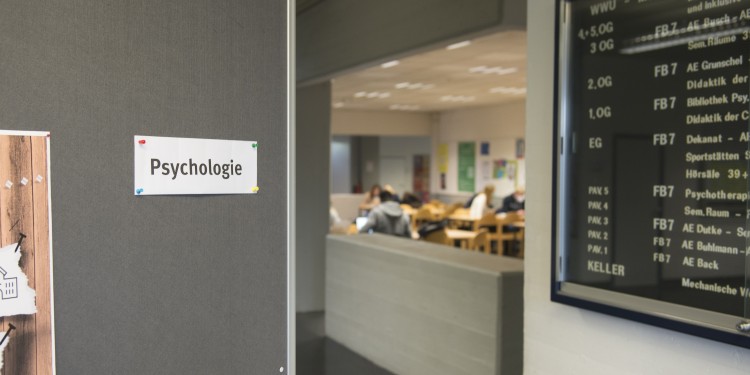
"Appropriate pay for graduates"
Psychology courses and psychotherapists’ training at the University of Münster were reformed in the winter semester of 2020/21 as a result of an amendment to existing legislation. Prof. Guido Hertel, Dean of the Faculty of Psychology and Sport Science at the University, discusses in this interview with Kathrin Nolte the new features and their significance.
What does the amendment involve?
The most important change consists in the fact that students now have the possibility to finish their Psychology course with a licence to practice as a psychotherapist. This means that their degree has the same status as a degree in Medicine or Pharmacy – which is not unimportant for their careers. Even more important is the fact that Psychology graduates who work as psychotherapists receive appropriate pay for their work immediately after completing their studies – and not only after a lengthy period of further training. The requirement for it is the successful completion of a recognised bachelor’s degree course in Psychology – as here in Münster – and a subsequent master’s degree in Psychology, with a Focus on Clinical Psychology and Psychotherapy. This master’s course will be starting up here in Münster, in line with the new law, as soon as the first graduates from the bachelor’s course reach that stage – which means the winter semester of 2023/24.
And what are the new aspects relating to the Psychology degree course?
There are only a few changes to the bachelor’s course in Psychology, as even before the reform the curriculum corresponded for the most part to the stipulations in the new legislation. However, undergraduates aiming to qualify as psychotherapists must now complete their period of mandatory practical training in the clinical field during their degree course and they must enrol in courses in clinical psychology, choosing from among existing options. This means that students must already decide during their bachelor’s course whether they want to retain the option of becoming a psychotherapist or not. There are bigger changes to the master’s course in Psychology.

For the purpose of training future psychotherapists, we here at Münster are in the process of introducing a new master’s course in Psychology, with a Focus on Clinical Psychology and Psychotherapy, which will not only have a clear thematic focus, but will also include practical elements. The specific contents follow the national licencing regulations on the basis of the new legislation. At the same time, the previous master’s course in Psychology will be continued and expanded. In addition to the existing focuses on ‘Personnel and Business Psychology’ and ‘Learning, Developing & Advising’, there will be a further research-oriented focus entitled ‘Social Dynamic Systems’ from the winter semester of 2023/24. For this winter semester 2023/24 we are also planning to introduce our new interdisciplinary master’s course in ‘Cognitive Neurosciences’, with Psychology taking a leading role. All in all, what this development shows is that the subject of Psychology is enjoying strong growth, professionalising itself more and more in its different career areas.
Will training as a psychotherapist also change?
Essentially, the new legislation means that training as a psychotherapist will be more closely tied to universities and comparable academic institutions, and this will ensure an even faster transfer of knowledge. The quicker licencing procedure and, as a result, professional recognition as a psychotherapist, will lead to earlier financial security. Nevertheless, training as a psychotherapist does not, as a rule, conclude with passing the licencing examination. Instead, there has to be further in-service specialist training, lasting several years, during which, for example, there is specialisation in therapeutic methods approved by medical insurance providers – similar to the specialist medical training which physicians undergo.
Commentary:
Prof. Conny Herbert Antoni, Chair of the Association of Psychology Faculties, comments on the reform of the subject:
“I welcome the reform of training for psychotherapists, as it embeds the training in universities and ensures high, uniform standards. It can be integrated in polyvalent bachelor’s and master’s degree courses in Psychology, which makes it possible to interlink psychology teaching, research and care. Students can now qualify to receive their licence during their studies and continue their specialist training whilst in paid employment. It puts an end to their unpaid work in their year in psychiatry.”
In brief: How do students rate the reforms?
Janne Gramzow, 3rd semester, bachelor’s degree:
I welcome the new examination regulations. The clear, important benefits for me are not only the financial support during the extra training, but also the greater number of professional and practical elements in the course. But there are also drawbacks: I’m afraid of increased competition for places for practical training or on master’s courses because the criteria are now much stricter.
Sophie Schlüter, 3rd semester, bachelor’s degree:
The benefits are the specialisation and the wide practical experience during the course, as well as the prospect of a better financial situation during later further training. Although we’re the first year affected by the new exam regulations, we’re fortunate in that the Dean’s Office has organised everything well. One thing I am worried about, though, is the competition for places on the master’s course for becoming licenced.
Dania Habaal, 5th semester, bachelor’s degree:
The reforms will help. As a result, we’ll no longer have to finance our training through sideline jobs and huge debts. But we’re not at that stage yet: we can’t bank on places or times. Also, becoming a therapist should be more straightforward, without people from other disciplines coming in. That reduces perspectives and means more restrictions on admissions through numerus clausus. Important resources are lost.
This article first appeared in the University newspaper "wissen|leben”, No. 8, 15 December 2021.
